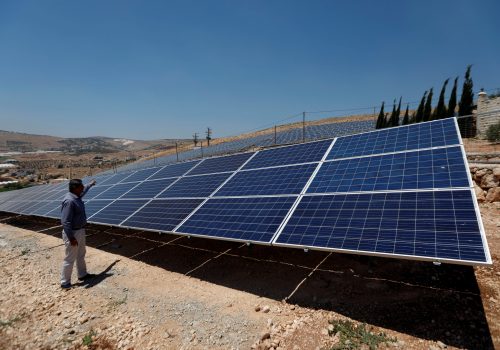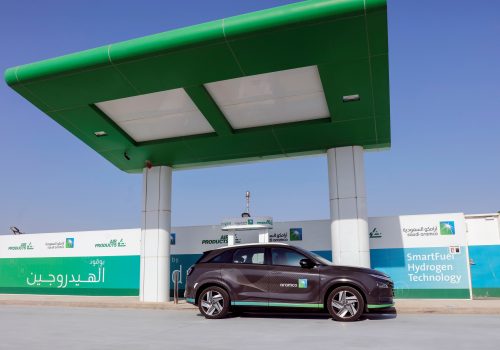Why Israeli gas and Syrian sanctions relief may turn on Lebanon’s lights
Perhaps Hezbollah Secretary-General Hassan Nasrallah will soon turn his lights on thanks to Israel’s natural gas, which is produced by an American oil and gas company. How could this be? With an endorsement from the United States and financing from the World Bank, leaders from Egypt, Lebanon, Syria, and Jordan are looking to provide Lebanon with Egyptian natural gas and Jordanian electricity.
However, any natural gas from Egypt is mixed with Israeli gas before it reaches Jordan, making it impossible to separate the molecules, while much of Jordan’s electricity is also generated from Israeli gas. What a bitter pill this must be for Hezbollah and its leader to swallow. It is unclear whether US officials, or Nasrallah himself, recognize or are looking to disguise the role Israel’s natural gas may play in rescuing Lebanon from its largely self-imposed economic collapse.
To make this energy deal a reality, the US may grant a waiver for the Caesar Syria Civilian Protection Act of 2019, which places heavy sanctions on the Bashar al-Assad regime, because any gas and electricity from Egypt and Jordan—and Israel—will have to traverse Syria. The Joe Biden administration may create a loophole that these energy transfers are not “significant” and, rather than provide a waiver, choose to ignore the sanctions. Beyond the Caesar Act, the Biden administration will also have to ignore its new rules that prohibit supporting multinational banks, including the World Bank, from financing fossil fuel projects.
The question then becomes why the US would provide Assad with gas transfers to support Lebanon’s newly formed government backed by Hezbollah—a designated terrorist group by the US and European Union? Before the US and World Bank throw a lifeline to either Assad or Lebanon, they should demand concessions that reduce Iranian and Russian influence in the region. Concessions should include decreased Iranian presence in Syria, a rollback of Hezbollah influence and economic reforms in Lebanon, and the allowance of in-kind gas subsidies rather than cash transfers to Assad. Ideally, the US avoids another regional mistake where the US again forfeits more regional influence and reputation rather than demanding concessions that align with US interests.
Lebanon’s energy crisis
Lebanon’s acute energy crisis is a glaring symptom of its collapse and the growing influence of the Islamic Revolutionary Guard Corps’(IRGC) offspring, Hezbollah, within its political and military institutions. Nasrallah has become increasingly eager to deflect the blame from Hezbollah for Lebanon’s economic demise and, in August, promised to obtain Iranian fuel that would rescue Lebanon’s imploding energy grid. As Hezbollah was unable to receive these shipments, Nasrallah blamed the US and, by extension, Israel. But, in mid-September, Iranian fuel supplies arrived via Syria, which further proved Hezbollah’s strength and the failure of the Lebanese state.
Connecting Lebanon with Egyptian and Jordanian energy isn’t a new concept. However, the Donald Trump administration discounted the notion because it would materially benefit the Assad regime in Syria and prop up Lebanon’s Hezbollah-backed government without reforms. In fact, Lebanon was poised to invest in an offshore natural gas terminal, known as a Floating Storage and Regasification Unit (FSRU), through a consortium between Qatar Petroleum, Italian energy company ENI, and an American subsidiary. However, the tendering process was taken hostage by Lebanon’s political parties and, instead of one FSRU, as former Prime Minister Saad Hariri noted, Lebanon adopted three FSRUs: “one for the Shia, one for the Sunnis, and one for the Christians.”
However, no matter how one unravels this arrangement, Israeli gas is at the center of this proposed solution.
In August, US Ambassador to Lebanon Dorothy Shea expressed US support for the deal, without mentioning how it supports US national security interests. Yet, the outline for US rationale has slowly emerged. Jordan’s King Abdullah reportedly raised the issue with President Biden during their meeting on July 19 with the argument that, with Russian support, engagement with Syria to connect Jordanian and Egyptian energy supplies will somehow diminish Iran’s influence with Assad and in the region. On September 9, the energy ministers from Egypt, Jordan, Syria, and Lebanon met to finalize this roadmap, which would begin with Egyptian gas and then be followed by Jordanian electricity.
Much of Syria’s pipeline that connects with Lebanon requires significant repairs and runs through the rebel-controlled southern area of Daraa province. On September 8, in a deal negotiated by Russia and likely with US support, Syrian forces moved into Daraa to reclaim government control—another puzzling step where the US has effectuated Assad’s reclamation of his dictatorial and genocidal control over the country. And it remains unclear what concessions the US obtained, other than another expectation for a change in Assad and Iran’s behavior.
In essence, the US has rationalized that Lebanon lies on the road to normalization with Syria and, somehow, Beirut and Damascus will become less aligned with Tehran through energy subsidies. It’s a concept as difficult to conceive as it is to write. Ambassador Jeffrey pleaded on September 9 that America’s waning reputation and inability to exact concessions from US adversaries, which was severely damaged by the US’s failed negotiations with the Taliban, may implore the Biden administration to do something to support Jordan’s plan. However, the US, up until now, has not communicated what conditions it would demand for its support for this policy approach and what measures would be demanded and taken to ensure this outcome.
Demanding concessions
While it is clear that King Abdullah looks to solve Jordan’s Syrian refugee burden, doing so shouldn’t come at the expense of overlooking Assad’s actions that created the crisis or US sanctions aimed at holding the Syrian dictator accountable. Therefore, the US should demand concessions from Assad before waiving sanctions on his regime. This should include clear and verifiable reduction in Iranian and IRGC presence in Syria and begin with them halting ground and air shipments of munitions through Iraq and Syria that ultimately supply Hezbollah and Hamas in the Gaza Strip. The US should also prevent any cash remuneration for the Assad regime. Any fees paid to Syria for gas shipments to Lebanon should only be made in-kind, with natural gas supplies so Assad cannot materially profit from the arrangement at the further cost of Syrians.
For Lebanese concessions, surely US conditions for economic reform should mirror and support those also pushed by the International Monetary Fund. Lebanon’s new Prime Minister, Najib Makati, has pledged reform like his predecessors. However, his cabinet is packed with hand-picked members from the ruling parties responsible for Lebanon’s corruption and dysfunction. It would seem prudent and necessary for the US to require some form of untangling of Hezbollah’s grip on Lebanon’s political and economic institutions in exchange for US support.
Hezbollah’s growing influence with the Lebanese Armed Forces created an annual debate within the Trump administration and Department of Defense on whether additional US security could be justified. The status quo of the Pentagon’s security assistance, with the hope of a different outcome, routinely won the bureaucratic debate, despite the evidence that Hezbollah and, thus, Iran’s influence only increased.
In the wake of the Taliban’s takeover in Kabul, one should hope such justifications for support in Lebanon become more challenging in the future. It will also be fascinating to see how Israel calculates its role in this arrangement, to include its own natural gas sourced molecules and electrons, which are bound for Nasrallah’s bedroom. But together, the US and Israel, with the support of significant Congressional scrutiny, should determine whether another lifeline to Lebanon and Assad further erodes US influence in the Middle East.
Matthew Zais is a nonresident senior fellow with the Atlantic Council’s Scowcroft Middle East Security Initiative and the vice president of government affairs for Hillwood and HKN Energy Ltd. Most recently he served as the principal deputy assistant secretary of international affairs at the US Department of Energy. Follow him on Twitter: @matthewzais.
Image: Syrian tankers carrying Iranian fuel arrive at the eastern village of Al-Ain, Lebanon. The first shipment of Iranian fuel oil for Lebanon arrived in the country Thursday, secured on its journey by Tehran's main ally Hezbollah. The arrival of the Iranian fuel came days after a new government, headed by Prime Minister Nagib Mikati, was formed thus ending 13-months of political deadlock in the country. (Reuters)


